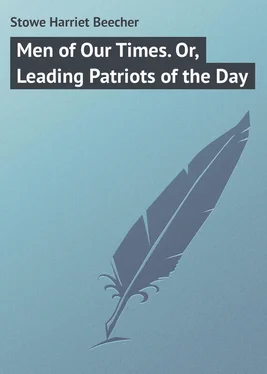Harriet Stowe - Men of Our Times. Or, Leading Patriots of the Day
Здесь есть возможность читать онлайн «Harriet Stowe - Men of Our Times. Or, Leading Patriots of the Day» — ознакомительный отрывок электронной книги совершенно бесплатно, а после прочтения отрывка купить полную версию. В некоторых случаях можно слушать аудио, скачать через торрент в формате fb2 и присутствует краткое содержание. ISBN: , Жанр: foreign_language, foreign_prose, на английском языке. Описание произведения, (предисловие) а так же отзывы посетителей доступны на портале библиотеки ЛибКат.
- Название:Men of Our Times. Or, Leading Patriots of the Day
- Автор:
- Жанр:
- Год:неизвестен
- ISBN:http://www.gutenberg.org/ebooks/46347
- Рейтинг книги:5 / 5. Голосов: 1
-
Избранное:Добавить в избранное
- Отзывы:
-
Ваша оценка:
- 100
- 1
- 2
- 3
- 4
- 5
Men of Our Times. Or, Leading Patriots of the Day: краткое содержание, описание и аннотация
Предлагаем к чтению аннотацию, описание, краткое содержание или предисловие (зависит от того, что написал сам автор книги «Men of Our Times. Or, Leading Patriots of the Day»). Если вы не нашли необходимую информацию о книге — напишите в комментариях, мы постараемся отыскать её.
Men of Our Times. Or, Leading Patriots of the Day — читать онлайн ознакомительный отрывок
Ниже представлен текст книги, разбитый по страницам. Система сохранения места последней прочитанной страницы, позволяет с удобством читать онлайн бесплатно книгу «Men of Our Times. Or, Leading Patriots of the Day», без необходимости каждый раз заново искать на чём Вы остановились. Поставьте закладку, и сможете в любой момент перейти на страницу, на которой закончили чтение.
Интервал:
Закладка:
Lincoln knew all this, and turned it over in the calm recesses of his mind, with a quiet endurance, gilded at times by a gleam of the grim, solemn humor peculiar to himself. "I cannot make generals," he said once, "I would if I could." At another, to an important man who had been pressing some of his own particular wisdom upon him, "Perhaps you'd like to try to run the machine yourself." Somebody gave him a series of powerful criticisms which a distinguished writer had just poured forth on him. "I read them all through," he said quaintly, "and then I said to myself, Well, Abraham Lincoln, are you a man, or are you a dog?"
No man in the great agony suffered more or deeper, but it was with a dry, weary, patient pain, that many mistook for insensibility. "Whichever way it ends," he said to the writer, on one occasion, "I have the impression that I shan't last long after it's over."
After the dreadful repulse at Fredericksburg, he is reported to have said, "If there is a man out of hell that suffers more than I do, I pity him." In those dark days, his heavy eyes and worn and weary air told how our reverses wore upon him, and yet there was a never failing fund of patience at bottom that sometimes rose to the surface in bubbles of quaint sayings or a story that forced a laugh even from himself. The humor of Lincoln was the oil that lubricated the otherwise dry and wiry machinery of his mind. The power of looking at men and things with reference to their humorous side, enabled him to bear without irritation many things in the political joltings and jarrings of his lot, which would have driven a more nervous man frantic. It is certainly a great advantage to be so made that one can laugh at times when crying will do no good, and Lincoln not only had his own laugh in the darkest days, but the wherewithal to bring a laugh from a weary neighbor. His jests and stories helped off many a sorry hour, and freshened the heart of his hearer for another pull in the galling harness.
He saw through other men who thought all the while they were instructing or enlightening him, with a sort of dry, amused patience. He allowed the most tedious talker to prose to him, the most shallow and inflated to advise him, reserving only to himself the right to a quiet chuckle far down in the depths of his private consciousness. Thus all sorts of men and all sorts of deputations saw him, had their talks, bestowed on him all their tediousness, and gave him the benefit of their opinions; not a creature was denied access, not a soul so lowly but might have their chance to bore the soul of this more lowly servant of the people. His own little, private, quiet, harmless laugh was his small comfort under all these inflictions. Sometimes the absolute confidence with which all contending sides urged their opinions and measures upon him, seemed to strike him with a solemn sense of the ludicrous. Thus when Dr. Cheever, at the head of a committee of clergymen, had been making a vigorous, authoritative appeal to him in Old Testament language, to end all difficulties by emancipation, Lincoln seemed to meditate gravely, and at last answered slowly, "Well, gentlemen, it is not very often that one is favored with a delegation direct from the Almighty !"
Washington, at this time, was one great hospital of wounded soldiers; the churches, the public buildings all filled with the maimed, the sick and suffering, and Lincoln's only diversion from the perplexity of state was the oversight of these miseries. "Where do you dine?" said one to him in our hearing. "Well, I don't dine, I just browse round a little, now and then." There was something irresistibly quaint and pathetic in the odd, rustic tone in which this was spoken.
Even the Emancipation Proclamation – that one flag stone in the wide morass of despondency on which the wearied man at last set firm foothold, did not at first seem to be a first step into the land of promise.
It was uttered too soon to please some parties, too late to please others. In England it was received in the face of much military ill success, with the scoffing epigram that the President had proclaimed liberty in the states where he had no power, and retained slavery in those where he had. It is true there was to this the sensible and just reply that he only gained the right to emancipate by this war power, and that of course this did not exist in states that were not at war; but when was ever a smart saying stopped in its course by the slow considerations and explanations of truth?
The battle of Gettysburg was the first argument that began to convince mankind that Mr. Lincoln was right. It has been well said, that in this world nothing succeeds but success . Bonaparte professed his belief that Providence always went with the strongest battalions, and therein he expressed about the average opinion of this world. Vicksburg and Gettysburg changed the whole face of the nation – they were the first stations outside of the valley of the shadow of death.
The nation took new courage – even the weary clamorers for peace at any price, began to shout on the right side, and to hope that peace might come through northern victory, and so it did come, they did not care how.
Whereas a few months before, Lincoln was universally depreciated, doubted, scoffed and scorned, now he found himself re-elected to the Presidential chair, by an overwhelming majority. It was in fact almost an election by acclamation. When the votes were being counted in New York late at night, and this victory became apparent, the vast surging assembly at the motion of one individual, uncovered their heads and sang a solemn Doxology – an affecting incident which goes far to show what sort of feelings lay at the bottom of this vast movement, and how profoundly the people felt that this re-election of Lincoln was a vital step in their onward progress.
At this hour the nation put the broad seal of its approbation on all his past course. At this moment she pledged herself to follow him and him alone to the end.
Perhaps never was man re-elected who used fewer of popular arts – made fewer direct efforts. He was indeed desirous to retain the place, for though he estimated himself quite humbly, still he was of opinion that on the whole his was as safe a hand as any, and he had watched the navigation so far as to come to love the hard helm, at which he had stood so painfully. In his usual quaint way he expressed his idea by a backwoods image. Alluding to the frequent fordings of turbulent streams that are the lot of the western traveller, he said, "It is'nt best to swap horses in the middle of a creek."
There was something almost preternatural in the calmness with which Lincoln accepted the news of his re-election. The first impulse seemed to be to disclaim all triumph over the opposing party, and to soberly gird up his loins to go on with his work to the end.
His last inaugural has been called by one of the London newspapers "the noblest political document known to history."
It was characterized by a solemn religious tone, so peculiarly free from earthly passion, that it seems to us now, who look back on it in the light of what has followed, as if his soul had already parted from earthly things, and felt the powers of the world to come. It was not the formal state-paper of the chief of a party in an hour of victory, so much as the solemn soliloquy of a great soul reviewing its course under a vast responsibility, and appealing from all earthly judgments to the tribunal of Infinite Justice. It was a solemn clearing of his soul for the great sacrament of death:
" Fellow Countrymen – At this second appearing to take the oath of the Presidential office, there is less occasion for an extended address than there was at the first. Then a statement somewhat in detail of a course to be pursued seemed very fitting and proper. Now, at the expiration of four years, during which public declarations have been constantly called forth on every point and phase of the great contest which still absorbs the attention and engrosses the energies of the nation, little that is new could be presented.
Читать дальшеИнтервал:
Закладка:
Похожие книги на «Men of Our Times. Or, Leading Patriots of the Day»
Представляем Вашему вниманию похожие книги на «Men of Our Times. Or, Leading Patriots of the Day» списком для выбора. Мы отобрали схожую по названию и смыслу литературу в надежде предоставить читателям больше вариантов отыскать новые, интересные, ещё непрочитанные произведения.
Обсуждение, отзывы о книге «Men of Our Times. Or, Leading Patriots of the Day» и просто собственные мнения читателей. Оставьте ваши комментарии, напишите, что Вы думаете о произведении, его смысле или главных героях. Укажите что конкретно понравилось, а что нет, и почему Вы так считаете.












